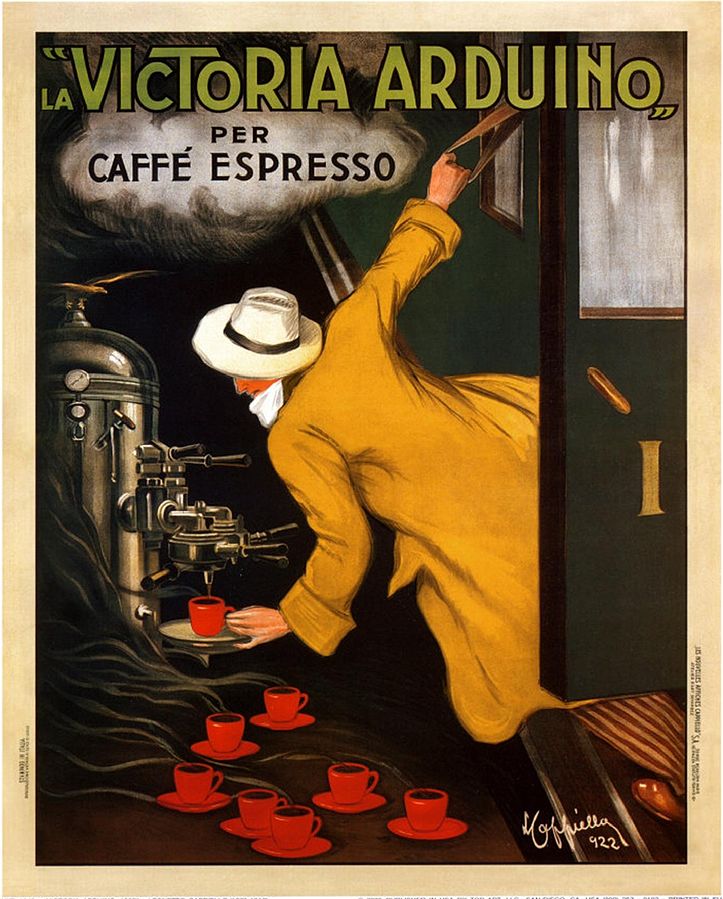Of Man, War, and Espresso

“Calling to arms all men from 21 to 55 years old, Italy can mobilize 8,000,000 men, and adding young men of 18, 19, and 20 years more than 9,000,000 ….”
The nation’s leader, Benito Mussolini—or better known as II Duce to his people—did not fail to cast a spell on the cheering crowd on the 30th of March 1938. His speech continued to spark the crowd as he shouted,
“This shows how ridiculous are the polemics of certain circles beyond the Alps according to which the African war, the formation of two army corps in Libya and the participation of volunteers in the Spanish war have weakened us.
On the contrary, all that strengthened us …”
In fascist Italy, the modern Italian man is what makes up the nation—he is the nation, the nation is him. War was no longer seen as misery, but an honor. It was a time of great hope and pride as II Duce attempted to revive the glory of the Roman Empire. The men were the soldiers; the women were mothers who earned medals for supplying the nation with its soldiers and workers.
The fascist regime promoted espresso to the workers. In the morning, workers line up against the counters of espresso bars, sipping their cups only for minutes, before dashing off to work for the nation. The new steam espresso machine makes coffee fast like a speeding steam train, but just cool enough to immediately drink. In only seconds the espresso will flow smoothly from the machine like a long mouse tail into the small cups, an analogy with the steam trains, which in a split second, will arrive at the stations as scheduled. Even though the promptness of the trains was false, both the train and the espresso machine served as Mussolini’s propaganda to demonstrate the technological advancement, industrialization, and modernization of what was once a war-torn Italy.
The nation was trying to rise from its knees by the lift of a strongman as the memory of the First World War had slowly dwindled but not forgotten. For Mussolini, founder of Italy’s National Fascist Party—the Italian espresso was the nation’s drink, that of a modern Italy. For the nation’s strongman, it was political as much as cultural.
Looking back, who would have thought that the strongman, who vowed to lift Italy from the trenches, would be executed in humiliation as he was by the people of his country? On April 28, 1945, Mussolini was captured while trying to flee with his mistress.
The empire Mussolini aspired to build did not, by far, have the military skills of the Romans. The dictator who was responsible for the war losses and death of his people had left his wife of three decades and their children to escape and save himself.
Even more humiliating was what happened after his death. On April 29th, 1945, the bodies of II Duce and his mistress, Clara Petacci, and three supporters who were executed along with them, were hanged upside down at the town square of Milan to satisfy the angry mob. This event is what is best remembered of the strongman who fell from grace.
Nonetheless, the Italian espresso and the coffee bars that Mussolini used in his fascist propaganda were quickly disassociated with the strongman. The Italian espresso culture lived on to be celebrated around the world.
-Some Thoughts from the Cappuccino Girl- (2021)
#fascism #WorldWar1 #WorldWar2 #Italy #Espresso #history
Note: Mussolini’s speech is quoted from: http://bibliotecafascista.blogspot.com/2012/03/speech-in-senate-march-30-1938.html.
I first wrote this piece as a historical fiction short story, although it may have not turned out too well. In case you are interested, you can read it here: The Strongman's Espresso https://feministpassion.blogspot.com/2021/06/the-strongmans-espresso.html.
POPULAR TOPICS
#subculture
Gurlesque: Poetics of the Bizarre, Ugly, and Feminine
#films
Mrs. Robinson, Countercultures, and Politics
#history
The Dutch Golden Age, Golden for Whom?
I also write articles here: https://feministpassion.blogspot.com/
